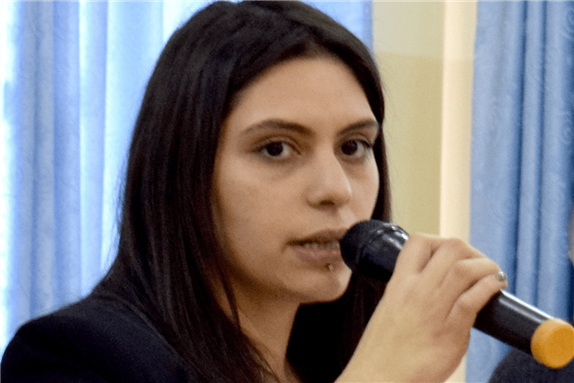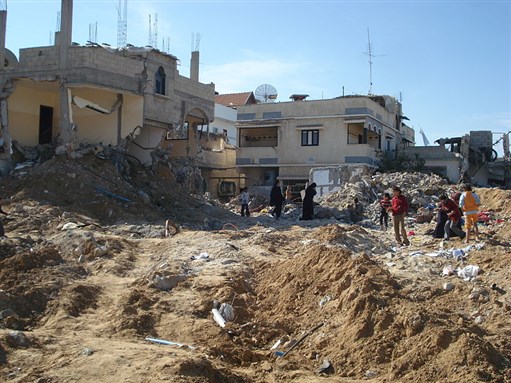“They deprived me from bidding you farewell with a kiss, so I bid you farewell with a flower.”
It is often said that the most unbearable pain a person can be forced to endure is to bury their child. Yet Israel, in an act of gratuitous cruelty meted out without a second thought, demonstrated its eagerness to inflict a level of suffering more unbearable still.
On Sunday 11 July, the lifeless body of Suha Jarrar, a 31-year old legal researcher with Al-Haq, the West Bank affiliate of the International Commission of Jurists, was found in an apartment in Ramallah’s Qaddura refugee camp. The cause of death appears to be cardiac arrest resulting from pre-existing disease. The immediate and widespread outpouring of grief reflected not only anguish at a promising life prematurely extinguished, but also that the young human rights activist made an impression upon all who knew her.
Her mother, Khalida Jarrar, a leader in the Popular Front for the Liberation of Palestine (PFLP) and an elected member of the Palestinian Authority (PA) parliament, learned of her daughter’s death in her prison cell in Haifa’s Damon Prison, where she is serving out the final months of a two-year Israeli sentence. Although she is what Israel terms a “security prisoner”, she is in fact a political prisoner. Neither accused nor sentenced for involvement in armed activity, the characterization basically means she’s an Arab.
Despite the nature of her sentence, and her having only approximately sixty days left until the completion of her sentence, the Israeli authorities rejected a temporary furlough that would have allowed her to bid farewell to her daughter with a kiss rather than a wreath delivered on her behalf.
The reason Israel rejected furlough for Khalida Jarrar is because she’s an Arab. This is exceptionally easy to demonstrate, and comes in the form of Ami Popper. Popper might be compared to Dylan Roof, the US white supremacist who in 2015 murdered nine African-Americans in a South Carolina church.
On 20 May 1990 Popper, a right-wing extremist wearing an Israeli military uniform and assault rifle, encountered a group of Palestinian day laborers from the Gaza Strip waiting at a bus stop south of Tel Aviv. Demanding to check their identity documents and compliance with Israel’s pass laws, he ordered the Palestinians to line up in rows on their knees, and proceeded to shoot them. Seven were immediately killed, and a further dozen seriously wounded. Popper was initially sentenced to seven life terms, but because he is a Jewish perpetrator of mass murder against Arabs his sentence was, rather predictably, in 1999 reduced to 40 years.
While in prison Popper married three times, produced a number of children, and was granted regular furloughs to visit his families. On one occasion in 2007 while driving without a license he was responsible for a traffic accident that resulted in multiple fatalities. Needless to say, the furloughs continued for this darling of the extreme right, including for his third wedding in Jerusalem in 2013. As is common when it comes to Israeli war crimes and terrorist activity, Popper’s family is sustained by a network of Israeli NGO’s and US tax-deductible “charities”.
Khalida Jarrar has by contrast never been convicted of anything, even under Israel’s perverse military court system. Rather, she has spent most of the past six years in administrative detention, commonly known as detention without charge or trial and, on occasions when this drew unwelcome scrutiny, in pre-trial detention. The sentence she is currently serving is the result of a plea bargain, which she accepted in the hopes of putting an end to this charade and thus her incarceration. The “evidence” against her that has been made public ranges from membership in the PFLP, to refusing orders by the Israeli military to relocate from one area under PA jurisdiction to another, to retracted testimony obtained under secret police interrogation, to attending a book fair, to being identified in a pictorial lineup where every other face was that of a man. For good measure she has been under an Israeli travel ban when not imprisoned.
During this time Khalida Jarrar has suffered a series of health issues, including several episodes of deep vein thrombosis and a neurological issue with her brain. In the latter case she sought to travel to Jordan for urgent diagnostic tests but the Israeli authorities, which at the time did not consider it necessary to confine her in their prisons on security pretexts, delayed approval of her application to travel for medical treatment for several months on security grounds. In other words, because she’s an Arab.
There is considerable circumstantial evidence that Israel’s primary issue with Khalida Jarrar is in fact the role she played in enabling the Palestine Liberation Organization (PLO) to file its case against Israel at the International Criminal Court (ICC) in The Hague. The suspicion has been repeatedly voiced not only by Palestinians, but also Israeli journalists who have followed her travails in recent years. Given the sheer absurdity of Israel’s various accusations against her over the years, and Israel’s hyperactive hostility to an ICC investigation of its crimes against the Palestinian people, it seems entirely reasonable to conclude that she is being persecuted for seeking to hold Israel accountable for its actions until proven otherwise. Refusing to capitulate to its determination to break her spirit runs a close second.
This week Khalida Jarrar was forced to pay an unfathomable price for her activism. That said, it is unlikely this was a pre-meditated act of revenge by Israel. Dealing with Palestinians like animals devoid of human qualities, undeserving of even the most elemental consideration, is very deeply ingrained in Israeli practice and comes naturally to its functionaries. Gratuitous cruelty is the default option, and typically arrives without a second thought.
What Khalida Jarrar has endured in recent years, and particularly this past week, is an instructive microcosm of Israeli-Palestinian relations. Palestinians, their leaders, and institutions either serve Israeli interests or have no value at all and are treated accordingly. At the slightest sign of opposition parliamentary immunity, the Palestinian Authority, rule of law, and similar concepts are instantaneously transformed into fiction. Israel acts as it does because it knows it can and is confident it will not be held to account by others.
On a personal note, I was this past week asked to sign several petitions demanding that Israel furlough Khalida Jarrar or urging foreign governments to demand her right to bid her daughter farewell. I refused to sign any of them. I did not want to dignify the illusion that Israel is capable of recognizing the humanity of an Arab, or the illusion that foreign governments give a damn about Israeli conduct towards the Palestinians. If we are serious about addressing Israeli conduct and foreign indulgence of Israeli impunity, we would do better to take to heart the final sentence of Khalida Jarrar’s moving tribute to her daughter Suha: “Your absence is searingly painful, excruciatingly painful. But I remain steadfast and strong, like the mountains of beloved Palestine.”


















